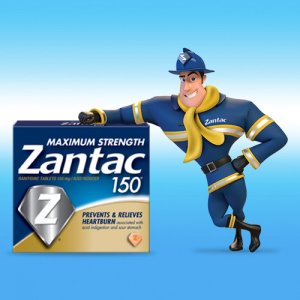A few weeks back I made a note in my log. I’d spotted a Zantac TV ad out of the corner of my eye: some cartoon fire fighter rushing to quell the “fire” of indigestion. The implication was simple: you can eat as much toxic garbage food as you like and just take Zantac, it will “protect” you. Ha!

Do NOT eat manufactured foods. You’ll be fine. Sooner or later you are going to have to make this change, otherwise you will just grow old, get sick, and die young, and feel bad. Why not make the change right away? Then you can enjoy your remaining years in good health. You choose.
If you want to take indigestion seriously, get a copy of my book Diet Wise and figure out which are the right foods for YOU (forget the lame advice about spices, curries, fried food, red wine and all the usual garbage—any food can cause indigestion, if it’s not right for your body).
LINK: https://www.dietwisebook.com/
That’s not really what I’m writing about today.
Unless you live on the Planet Zod, you will have noticed a huge recall for generic Zantac (ranitidine, its real name). It’s found to be contaminated with a probable carcinogen. Sandoz, the manufacturers have also issued a recall for their own branded drug. That’s very big hearted of them—except when you remember that the patent has run out and they now have to compete with cheaper, generic alternatives! (call me cynical, Ha!)
As usual, the FDA is being very bossy and unhelpful, getting in everybody’s way, when there’s a job to be done.
Enter a web-based pharmacy, called Valisure. They perform their own tests on drugs they carry (that’s good!) and initially alerted the FDA to the ranitidine contamination issues in June 2019. It then filed a Citizen Petition in September urging the FDA to pull all ranitidine from the market.
That set off the furore. But says Valisure, the Zantac that’s being shelved across the country isn’t necessarily “contaminated” with a foreign chemical. More likely, ranitidine itself converts into this carcinogen, which is called N-nitrosodimethylamine (NDMA) or sometimes, dimethylnitrosamine (DMN)ma.
Nitrosamine, you may know, is a breakdown product of nitrates and nitrites used as a food preservative. Nitrites are used for processed meats and is the REAL reason “red meats” get a bad name. Red meats are GREAT for us, but studies ALWAYS lump processed filth (like “pink slime”) into the testing and then declare against red meat. Duh! We do know that consuming processed meats is strongly linked to an increased risk of cancer in the digestive tract, and many people, me included, believe that the nitrates/nitrites are the reason for that.
Let’s do what the cosmetics companies call the science bit!…
NDMA is a semi-volatile organic chemical, produced as by-product of several industrial processes and present at very low levels in certain foodstuffs, especially those cooked, smoked, or cured. It is toxic to the liver and other organs and is a probable human carcinogen. It is also used to create cancer in rats for cancer research.
NMDA is also used in the manufacture of a component of rocket fuel. It’s a problem in treatment by chlorination or chloramination of organic nitrogen-containing wastewater, because NDMA is produced as a side effect.
Further, NDMA is found at low levels in numerous items of human consumption, including cured meat, fish, beer, tobacco smoke and as an impurity in pharmaceuticals.
So What’s The Problem (Apart from Poisoning Us?)
“The fundamental problem is that [ranitidine is] an unstable molecule,” David Light, CEO of Valisure, told MedPage. “The drug itself can directly degrade and form, with very high efficiency, NDMA.”
The FDA had to step in to save businesses and jobs, by claiming (falsely) that Valisure’s testing method is “not suitable for testing ranitidine because heating the sample generates NDMA.”
How much of a lie is that? It’s exactly the same method as the one the FDA uses to reveal NDMA in angiotensin receptor blockers (ARBs)—it involves heating the compound to 130 °C, or about 266 °F!
FDA said a protocol that doesn’t use elevated temperatures should be deployed instead, and this has revealed lower levels of NDMA in ranitidine—although the agency at least admitted that those levels are “unacceptable.”
David Light argued that other studies using other conditions also showed NDMA as a ranitidine breakdown product, including exposure to chlorine (particularly in wastewater treatment plants) and ozone.
Even a hot car in transit could do it, Light said.
Some tests mimicking the stomach environment have shown that ranitidine yielded 300,000 ng of NDMA from a 150-mg tablet.
That’s more than 3,000 times the level the FDA set when it had to decide how much NDMA could be tolerated in angiotensin receptor blockers (ARBs).
William Mitch, PhD, of Stanford University, co-authored a 2016 paper that found an average of 48,000 nanograms of NDMA in 24-hour urinary excretion after participants took a 150-mg ranitidine dose, a 400-fold spike from baseline.
“We don’t know if the ranitidine was converted to NDMA in the stomach or in the body (e.g., liver), because we only measured the urine,” Mitch said in an email to MedPage. “But we suspect some conversion in the body since the levels we were seeing were higher than previous measurements of NDMA in human gastric juice after ranitidine consumption.”
While FDA hasn’t ordered a recall of ranitidine products, other countries — including Canada, Germany, France, Italy, Switzerland, and Austria — have done so, and major U.S. retailers including CVS, Walmart, Walgreens, and Rite-Aid have pulled all ranitidine including branded Zantac from store shelves.
Sandoz and Apotex have voluntarily recalled their versions.
The FDA is wrong, damnably wrong. They are trying to force this as a contamination issue and it isn’t. It’s a biodegradation issue (metabolic conversion).
“Contamination is almost irrelevant compared with the fundamental instability of this drug,” said David Light. I trust him but not FDA officers.
Valisure launched about a year ago, positioning itself as a pharmacy, a lab, and a wholesaler. Now licensed in 38 states and with a staff of 12 in Yale University’s Science Park in New Haven, Connecticut, it analyzes some 2,000 compounds — mainly generics, and now some brands—to introduce a level of online drug quality control into the system that Light says didn’t exist before.
With fears of contamination (fuelled by pharmaceutical companies to scare people off the cheaper competition), it’s smart to analyze drugs at the point of consumption. I do NOT trust Chinese manufacturing. However, I have no issue with products from India.
Valisure, incidentally, was the first to detect the industrial solvent dimethylformamide (DMF) in the drug valsartan. DMF is also classified by the WHO as a probable carcinogen.
Given ranitidine’s popularity, physicians are facing questions from patients about whether they should be tossing it from their medicine cabinets.
My advice to you is to toss it and clean up your diet. THERE IS ABSOLUTELY NO REASON FOR GERD, SO-CALLED, OR INDIGESTION, EXCEPT EATING THE WRONG FOODS FOR YOUR UNIQUE BODY.
Why do it?

Prof. Keith Scott-Mumby
The Official Alternative Doctor
That link again, only if you ARE really serious: www.DietWiseBook.com
And if Valisure appeals to you (I have no financial connection with them) you might like to visit their website: www.valisure.com
NOTES: Medpage Today: by Kristina Fiore, Director of Enterprise & Investigative Reporting, MedPage Today, October 03, 2019

